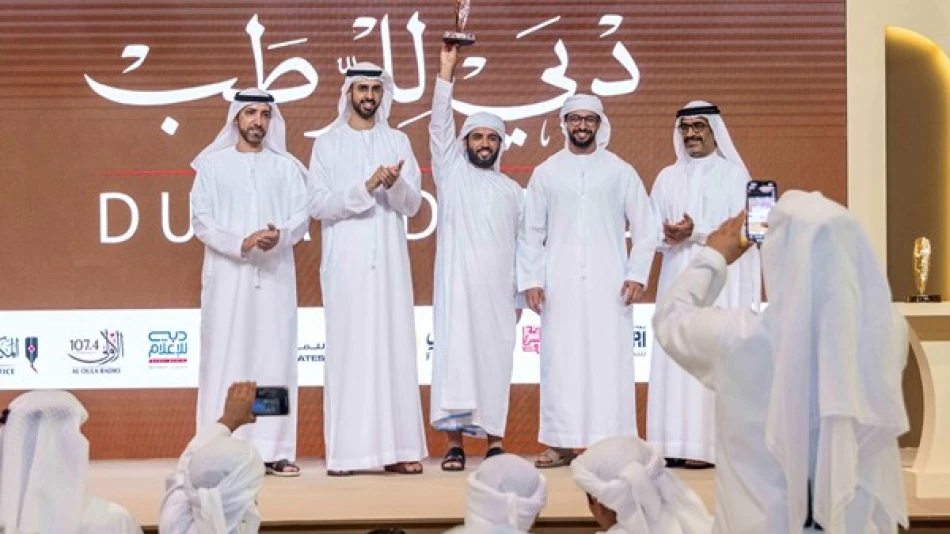
Dubai Dates Festival Concludes Second Edition with Resounding Success
Dubai's Date Festival Emerges as Cultural Powerhouse, Blending Heritage with Modern Sustainability Goals
Dubai's second annual Date Festival has concluded with remarkable success, drawing hundreds of palm tree owners, local producers, and families to celebrate the UAE's agricultural heritage while positioning the emirate as a leader in sustainable food production. The week-long event, held from July 25 to August 1, 2025, demonstrates how traditional industries can thrive in modern economies when backed by strategic government support.
Government Backing Signals Strategic Intent
The festival's high-profile closing ceremony featured UAE Minister of State for Artificial Intelligence, Digital Economy and Remote Work Applications Omar bin Sultan Al Olama, alongside senior Dubai government officials. This level of official participation reflects the UAE's broader strategy to diversify its economy beyond oil while preserving cultural identity—a model increasingly adopted by Gulf states seeking sustainable growth.
The event crowned winners in the prestigious "Rare Cup" competition, recognizing excellence in date cultivation and palm tree preservation. More significantly, it awarded the Dubai Date Medal 2025 to prominent figures including the late Salem Mohammed Ghanem bin Al Sheikh and Sultan bin Khalifa Al Habtoor, acknowledging their contributions to preserving the emirate's palm heritage.
Economic Implications Beyond Tourism
While positioned as a cultural event, the festival serves multiple economic functions. It provides a direct marketplace for local producers, connecting them with consumers and potentially international buyers. This mirrors successful agricultural festivals in California's Napa Valley or France's wine regions, where cultural celebration drives economic value.
Supporting Local Production Chains
The festival showcased premium date varieties and rare palm seedlings, creating a specialized market that could command higher prices than commodity dates. This premium positioning is crucial for UAE agriculture, where production costs are inherently higher due to climate challenges and water scarcity.
Educational workshops on palm tree care and cultivation techniques suggest a longer-term vision: developing local expertise and potentially reducing dependence on imported agricultural knowledge. This knowledge transfer approach has proven successful in Israel's desert agriculture programs and could position the UAE as a regional hub for arid-climate farming innovation.
Cultural Preservation as Economic Strategy
Abdullah Hamdan bin Dalmouk, CEO of the Hamdan bin Mohammed Heritage Revival Centre, emphasized the festival's role in reinforcing the palm tree's social and cultural value while supporting national heritage preservation. This approach reflects a sophisticated understanding that cultural assets can drive economic value—similar to how countries like Japan leverage traditional crafts or Italy promotes regional food cultures.
Engaging the Next Generation
The festival's focus on educating younger generations about palm cultivation addresses a critical challenge facing traditional industries globally: knowledge transfer and continuity. Interactive workshops and field demonstrations create pathways for youth engagement, potentially ensuring the industry's long-term viability.
Regional Context and Future Implications
The festival's success comes as Gulf states increasingly invest in food security initiatives. The UAE's National Food Security Strategy 2051 aims to make the country among the world's most food-secure nations, and events like this support domestic production capabilities.
Compared to similar heritage festivals in neighboring countries, Dubai's approach stands out for its integration of sustainability messaging with cultural celebration. This positioning could attract international attention from agricultural technology companies and sustainable farming advocates, potentially leading to partnerships and investment opportunities.
The festival's expansion plans for coming years suggest confidence in its model. As climate change intensifies focus on drought-resistant crops, the UAE's expertise in date cultivation could become increasingly valuable globally, transforming a traditional cultural practice into a modern economic advantage.
Most Viewed News

 Layla Al Mansoori
Layla Al Mansoori






